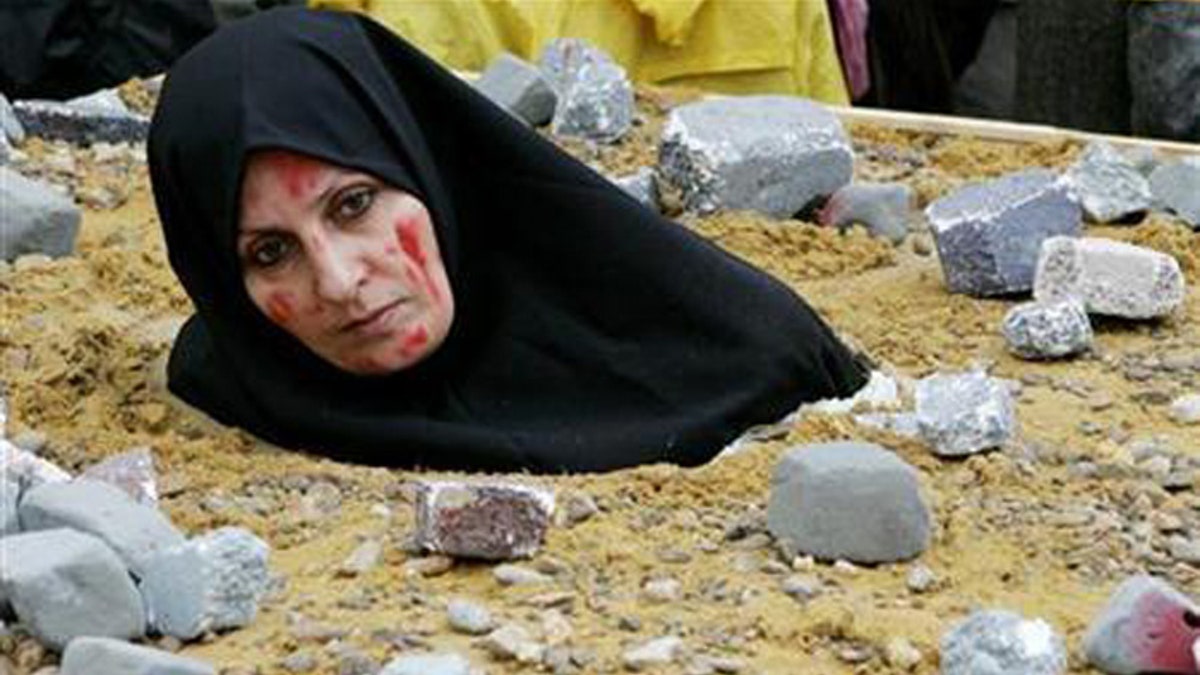
For this photo, an Iranian woman symbolically dressed up as a victim of death by stoning as part on a protest by the National Council of Resistance of Iran in Brussels. (Reuters)
As the world marks International Human Rights Day on Thursday, Iran is continuing its execution spree with the announcement that a woman has been sentenced to death by stoning.
The gruesome penalty, in which the wrongdoer is buried up to their shoulders and pelted with rocks, was first reported on the Persian-language Iranian website LAHIG. The woman, who was identified only by the initials “A.Kh,” was convicted of being complicit in her husband's murder.
An Iranian criminal court in Rasht, the capital city of the northern province of Gilan, handed down the brutal sentence.
“The rate of executions in Iran has not decreased in the last few years, it has increased," Maryam Nayeb Yazdi, a prominent Canadian-Iranian human rights activist based in Toronto, told FoxNews.com. "Although stoning has become more rare in Iran, such sentences are still being issued by Iranian judges. The probability of a stoning sentence to be carried out is slim due to the international sensitivity of the issue; there is a great chance her sentence may be ‘converted’ to death by hanging.”
“The rate of executions in Iran has not decreased in the last few years, it has increased."
Iran is believed to have imposed death by stoning on at least 150 people since the Islamic Revolution in 1980, according to the International Committees against Execution and Stoning.
"We need to note that an official Iranian website released the stoning sentence news, and we should question the regime's motives for doing so," said Nayeb Yazdi, who runs the translation blog Persian2English and works with the international NGO Iran Human Rights. "The stoning sentence is an indication of the Iranian regime's continued war against women in Iran. Arbitrary executions in Iran must be on top of the agenda in any dialogue between Iran and the West.”
After a widespread public-pressure campaign in the West in 2010, Iran dropped the stoning penalty against a 43-year-old Iranian woman. Sakineh Mohammadi Ashtiani was sentenced to stoning for alleged adultery. Her case remains shrouded in judicial mystery and it is unclear if she will still be executed.
“Whether or not one supports the nuclear deal with Iran, it is astonishing that the West cultivates an ever-closer alliance with a theocratic regime widely known for its abysmal human rights record and aggressive behavior in the region," Julie Lenarz, executive director of the UK-based Human Security Center told FoxNews.com. "They hang men for the "crime" of writing poems; or engaging in peaceful protest; or loving someone of the same sex.
“Women are stoned for being raped and Iranian law even allows for juvenile executions. Iran is averaging three hangings per day at the moment and remains a pariah state with no regard for human life," she added. "In a despicable form of moral myopia, the gold rush for business, as the international sanctions regime begins to unravel, has made Western governments blind to the suffering of ordinary Iranians at the hands of the Ayatollahs.”
The UN's Human Rights Day is observed every year on Dec. 10 and commemorates the day in 1948 on which the UN General Assembly adopted the Universal Declaration of Human Rights.
Benjamin Weinthal reports on human rights in the Middle East. He is a fellow at the Foundation for Defense of Democracies. Follow Benjamin on Twitter@BenWeinthal








































